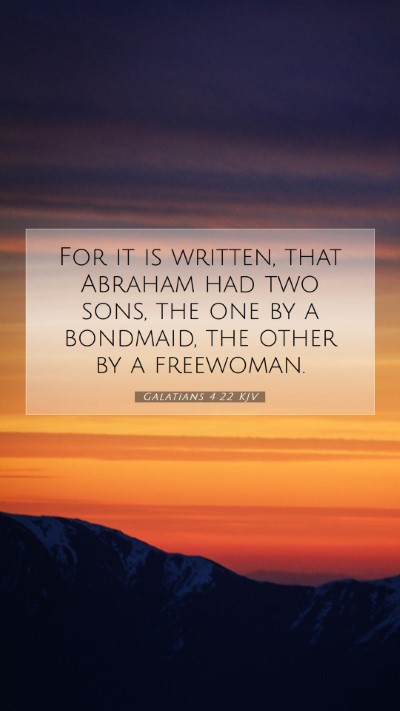Understanding Galatians 4:22
Galatians 4:22 states, "For it is written that Abraham had two sons, one by a bondwoman and the other by a freewoman."
This verse serves as a foundational element for Paul's argument regarding the two covenants and the nature of freedom and bondage in the context of salvation and law.
Contextual Background
To grasp the full meaning of this verse, understanding the historical and cultural context of Abraham's story is essential. The mention of Abraham invokes the patriarch of the Jewish faith, underlining the importance of lineage and God's covenant with His people.
Abraham's two sons—Ishmael, born of Hagar (the bondwoman), and Isaac, born of Sarah (the freewoman)—symbolize two contrasting approaches to God's promise.
Bible Verse Interpretations
-
Matthew Henry's Commentary:
Henry emphasizes the allegorical representation of Sarah and Hagar.
He explains that Hagar represents the covenant of law given at Sinai, while Sarah represents the covenant of grace.
This indicates the distinction between those who seek to be justified by law versus those who receive grace through faith.
-
Albert Barnes’ Notes:
Barnes articulates the implications of the two women, primarily focusing on their representation of two different nations and the types of worship they embody.
He asserts that those who are born of the freewoman, Sarah, enjoy the true freedom that comes from faith, unlike the servants under the law represented by Hagar.
-
Adam Clarke’s Commentary:
Clarke dives into the historical significance of birthright and inheritance within the context of Abraham's family.
He elucidates how the children of the bondwoman are symbolic of those who are still in bondage to the law rather than embracing the liberating power of grace through Christ.
Key Themes in Galatians 4:22
The verse highlights several important themes:
-
The Nature of Covenant:
The reference to Abraham’s sons illustrates the covenant God made with Abraham and how it translates to contemporary believers as either being heirs of God’s promise or remaining enslaved to the law.
-
Freedom vs. Bondage:
The contrast between the bondwoman and the freewoman signifies two different spiritual states.
Believers are called to recognize their freedom in Christ and not to return to the bondage of legalism.
-
Inheritance:
The narrative reflects on who receives the inheritance of the promises of God—those born of the Spirit through faith (the freewoman).
Applying the Verse to Daily Life
The teachings from Galatians 4:22 prompt us to examine our spiritual freedom.
We must ask ourselves if we are living in the grace and freedom provided by Christ or if we revert to legalistic practices that bind us.
This framework encourages believers to embrace their identity as children of God and to live in the fullness of His grace.
Bible Cross References
- Genesis 16:1-4: The account of Abraham, Hagar, and the birth of Ishmael.
- Genesis 21:1-3: The birth of Isaac and the promise to Sarah.
- Romans 9:7-8: Discussing who are the children of promise.
- Galatians 3:26-29: Those who are in Christ are Abraham's seed and heirs according to the promise.
- Galatians 5:1: A call to maintain the freedom Christ provides.
In summary, Galatians 4:22 marks an important theological conversation on the nature of covenant, freedom, and the inheritance we have through faith.
As we continue our journey of Bible study and explore the meaning of Bible verses,
we should be encouraged to understand the contrasts presented in scripture and apply the truths of God's Word to our lives.


